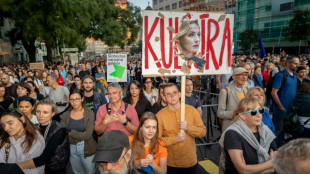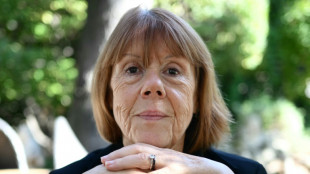
-
 Sweden ends rape inquiry allegedly targeting Kylian Mbappe
Sweden ends rape inquiry allegedly targeting Kylian Mbappe
-
Gaza rescuers say Israel kills 33 in morning strikes

-
 Suspense mounts as Macron prepares to unveil new French PM
Suspense mounts as Macron prepares to unveil new French PM
-
'Taste of love': Donkey milk cheese meets success in Albania

-
 Fears for the future as drug deaths among young Finns soar
Fears for the future as drug deaths among young Finns soar
-
Asian markets rise after Wall St record; eyes on China

-
 Nationalist minister tests Slovak culture, LGBT limits
Nationalist minister tests Slovak culture, LGBT limits
-
Blown off course, turbine giant Orsted seeks second wind

-
 Gisele Pelicot: France rape survivor who became a feminist hero
Gisele Pelicot: France rape survivor who became a feminist hero
-
Kevin Johnson: US boxer fighting for Putin's Russia

-
 How an ex-inmate of brutal Syria jail overcame trauma by helping others
How an ex-inmate of brutal Syria jail overcame trauma by helping others
-
Hawks beat Knicks, Rockets down Warriors to reach NBA Cup semis

-
 'Alarming' US mystery drones confound officials, scare locals
'Alarming' US mystery drones confound officials, scare locals
-
Korean Air buys majority stake in rival Asiana Airlines

-
 Australia to force tech titans to pay for news
Australia to force tech titans to pay for news
-
Australia to force tech titans to pay for news shared on platforms

-
 Taiwan detects 16 Chinese warships around island
Taiwan detects 16 Chinese warships around island
-
Trump taps election denier to head global media operation VOA

-
 Tokyo to make day care free to boost birth rate
Tokyo to make day care free to boost birth rate
-
Taiwan says detects 16 Chinese warships around island

-
 Asian markets fluctuate after Wall St record; eyes on China
Asian markets fluctuate after Wall St record; eyes on China
-
Vulnerable Afghans struggle as Taliban rebuild Kabul roads

-
 Amid weak eurozone and political turmoil, ECB to cut rates again
Amid weak eurozone and political turmoil, ECB to cut rates again
-
South Korea's Yoon vows to fight 'until the very last minute'

-
 Australia to spend $385 mn on PNG rugby league team with eye on China
Australia to spend $385 mn on PNG rugby league team with eye on China
-
Health insurers: the 800-pound gorilla in profit-driven US system

-
 Pope to champion popular Catholic traditions in Corsica
Pope to champion popular Catholic traditions in Corsica
-
Lithium-rich Bolivia lags behind in race to mine key metal

-
 Video game bosses gather at 'darkest hour' for industry
Video game bosses gather at 'darkest hour' for industry
-
Belichick inks deal to coach US college team

-
 Belichick inks deal to coach US college team: report
Belichick inks deal to coach US college team: report
-
UN General Assembly calls for 'unconditional' Gaza ceasefire

-
 Dortmund fear 'worst-case scenario' after Schlotterbeck injury
Dortmund fear 'worst-case scenario' after Schlotterbeck injury
-
Juve deepen Man City crisis, Barcelona into Champions League knockouts

-
 'Incredible' Saka makes the difference for Arsenal: Arteta
'Incredible' Saka makes the difference for Arsenal: Arteta
-
'We want more', says Olmo with Barcelona bound for knock-outs

-
 Guardiola 'questioning self' after latest City loss at Juve
Guardiola 'questioning self' after latest City loss at Juve
-
Nasdaq surges above 20,000 after US inflation data matches estimates

-
 Torres sinks Dortmund to send Barcelona into knockouts
Torres sinks Dortmund to send Barcelona into knockouts
-
UN General Assembly calls for 'unconditional' ceasefire in Gaza

-
 US House passes defense bill banning gender care for minors
US House passes defense bill banning gender care for minors
-
Turkey says Ethiopia, Somalia reach compromise deal to end feud

-
 Saka brace sinks Monaco as Arsenal eye Champions League last 16
Saka brace sinks Monaco as Arsenal eye Champions League last 16
-
Man City crisis deepens with Champions League defeat at Juventus

-
 Ashworth exit 'not the best' for Man Utd says Amorim
Ashworth exit 'not the best' for Man Utd says Amorim
-
Romero sorry over Spurs transfer jibe: Postecoglou

-
 Lula to undergo new operation to 'minimize' cranial bleeding risk
Lula to undergo new operation to 'minimize' cranial bleeding risk
-
New Syria PM says will 'guarantee' all religious groups' rights

-
 Wolfsburg earn key win over Roma in Women's Champions League, Lyon net six
Wolfsburg earn key win over Roma in Women's Champions League, Lyon net six
-
Murder rate in Amazon far higher than rest of Brazil: study


How an ex-inmate of brutal Syria jail overcame trauma by helping others
Riyad Avlar spent 20 years languishing in Syria's jails, including a decade in the infamous Saydnaya prison, the scene of some of the Bashar al-Assad government's most brutal abuses.
Those long years behind bars have left him with one obsession: documenting and healing the atrocities committed inside the prison where he himself was locked up.
"I am sure we'll see Bashar al-Assad in court one day," predicted Avlar, who is Turkish.
In 2017, just months after he was freed, he co-founded the Association of Detainees and Missing Persons of Saydnaya Prison (ADMSP), which advocates for those jailed for daring to defy Assad's rule.
"We don't want revenge, we want justice," he told AFP at the organisation's headquarters in Gaziantep, southeastern Turkey.
It is here that Avlar and others who survived the brutalities of Saydnaya collect and compile documentation and testimonies relating the horrors that occurred inside an institution Amnesty International has described as a "human abattoir".
Thousands of inmates in the prison just north of Damascus, some held since the 1980s, were freed on Sunday by Syrian rebels who seized the capital in a lightning advance.
Images of the former captives walking free, haggard and emaciated, some needing help even to stand, were beamed around the world as a symbol of Assad's fall.
"It made me so happy to see them (freed) but when I saw images of the walls and the cells, it took me straight back there," said Avlar, who was arrested in 1996 while studying in Damascus over a letter sent to relatives relating the government's abuses in Syrian prisons.
"I can still feel the trauma."
- 'So many people died' -
Even today, he sometimes jolts awake at night believing himself to still be behind bars -- he was once held inside a cell in pitch darkness for two months.
"I saw people die in front of my eyes, many from starvation," said the activist with fine-rimmed black glasses, whose salt-and-pepper beard hides a scar from the torture he was subjected to 25 years ago.
The guards, he said, would often throw scraps of food into the toilet in front of starving prisoners.
"The prisoners ate it because they had to stay alive," he said.
Part of his recovery was through theatre and learning the saz, a long-necked lute popular in Turkey -- which for him was "art therapy".
But it has also helped being part of the association's work, through which he has been able to help countless families acquire proof of life for loved ones held inside Saydnaya.
That was thanks to "insiders", prison employees who secretly passed internal documents to the organisation, he said, without giving further details.
- 'No more' -
Saydnaya, where hundreds of Syrians rushed this week in the desperate hope of finding their loved ones, now stands empty.
More than 4,000 inmates were freed by the Islamist-led rebels, the ADMSP said.
The group estimates that more than 30,000 people were either executed or died as a result of torture, starvation or lack of medical care between 2011 and 2018.
And with so many bodies, the authorities were forced to use rooms lined with salt as makeshift morgues to make up for the lack of cold storage.
Haunted by his grisly memories, Avlar has no interest in going back there but acknowledges he has long dreamed of the day when "Saydnaya would be turned into a place of remembrance".
"I am so happy there is not a single prisoner left in there," Avlar said.
"And I just hope there won't ever be any again."
C.Kovalenko--BTB
